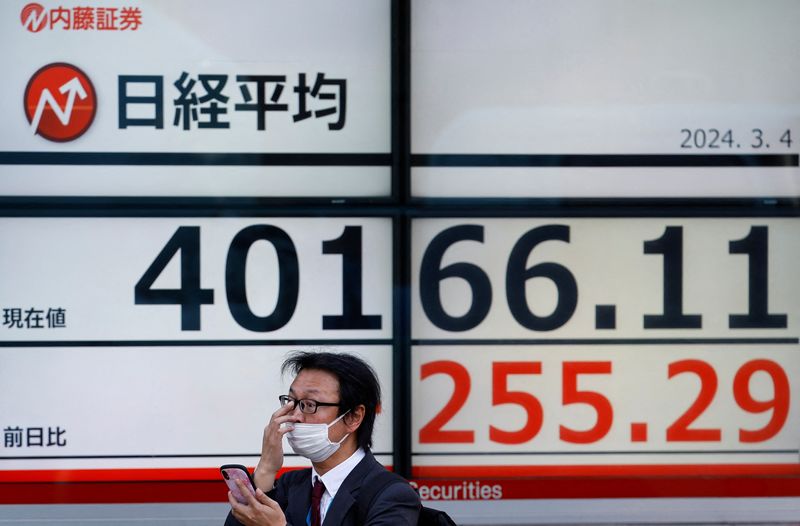A look at the day ahead in European and global markets from Wayne Cole.
It's been a largely risk-on start to a week packed with central bank events and major data that will refine market wagers for when developed world interest rates will finally start falling.
Japan's Nikkei cleared 40,000 for the first time having now climbed for five weeks in a row as it benefits from tech nearshoring and a flight of foreign funds out of Chinese markets.
The current poster child for the market is Tokyo Electron which has surged 55% since the start of the year, carried along by the AI craze. The firm makes equipment for manufacturing semiconductors and flat panel displays, showing how you only have to be tangentially associated with AI to reap the benefits.
Investors will face a test on Tuesday when Tokyo area consumer prices are forecast to rise back to an annual 2.5% in February, after base effects delivered a drop to 1.6% in January. The so-called core-core measure excluding food and energy is still seen slowing to 3.1%, from 3.3%.
Yet all the market chatter is about how the current wage round is going strongly and will likely lead the Bank of Japan to end negative rates in April, and unwind yield curve control.
Japan's government is considering declaring an end to deflation, reports Kyodo news agency, which would be another marker on the road to tightening.
An upbeat report on Q4 capex out Monday indicated GDP could be revised to positive from negative, meaning Japan isn't in recession after all. You've got to love the vagaries of economic data.
Also kicking off this week is China's National People's Congress (NPC) which might well flag new stimulus measures and set this year's GDP goal at 5%.
All eyes will be on U.S. Federal Reserve Chair Jerome Powell when he testifies before lawmakers on Wednesday and Thursday, though analysts assume he will stay in wait-and-see mode on policy given recent upside surprises on inflation.
The February payrolls report on Friday could also shift the calculus with forecasts favouring a still-solid rise of 200,000 after January's barnstorming 353,000 jump.
The European Central Bank meets Thursday and is considered certain to keep rates at 4.0%, but also lower its outlook for inflation in a nod to eventual cuts.
The Bank of Canada is likewise expected to stay on hold this week, with a first cut seen in June or later.
Other events of note include President Joe Biden's State of the Union address and the Super Tuesday U.S. primaries. The British government will release its budget on Wednesday but scope seems limited for pre-election giveaways.
Over this past weekend, OPEC+ members led by Saudi Arabia and Russia agreed to extend voluntary oil output cuts of 2.2 million barrels per day into the second quarter. [O/R]
That has given oil prices a further modest lift, after U.S. crude added 4.5% last week.
Key developments that could influence markets on Monday:
- Euro Zone Sentix Index for March

- Federal Reserve Bank of Philadelphia President Patrick Harker speaks
- American Airlines (NASDAQ:AAL) is scheduled to hold its first investor conference since the pandemic
(By Wayne Cole; Editing by Christopher Cushing)